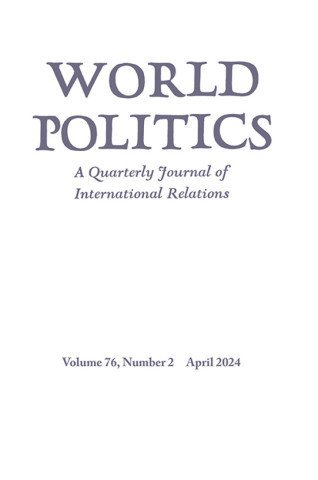冲突:轨迹与挑战
IF 4.5
1区 社会学
Q1 INTERNATIONAL RELATIONS
引用次数: 0
摘要
冲突研究领域在过去三十年中是如何发展的?本文通过提出三个问题来给出答案:我们为什么要研究冲突?我们如何理解冲突?我们如何研究冲突?文章以过去五年间发表在《世界政治》上的文章为例作了批判性评论。文章最后强调了该领域未来发展所面临的三大挑战:从理论上拓宽我们对冲突的理解;在微观、中观和宏观分析层面之间建立概念、理论和经验上的联系;从理论上明确适用于研究结果的范围条件。本文章由计算机程序翻译,如有差异,请以英文原文为准。
CONFLICT: Trajectories and Challenges
How has the field of conflict studies evolved over the past three decades? This essay suggests an answer by posing three questions: Why do we study conflict? What do we understand as conflict? And how do we study conflict? The article proceeds with critical remarks, illustrated with articles that have appeared in World Politics during the past five years. It concludes by highlighting three key challenges for the future evolution of the field: the theoretically driven broadening of our understanding of conflict; the development of conceptual, theoretical, and empirical links between micro, meso, and macro levels of analysis; and a theoretically informed way of specifying the scope conditions that apply to findings.
求助全文
通过发布文献求助,成功后即可免费获取论文全文。
去求助
来源期刊

World Politics
Multiple-
CiteScore
8.40
自引率
0.00%
发文量
24
期刊介绍:
World Politics, founded in 1948, is an internationally renowned quarterly journal of political science published in both print and online versions. Open to contributions by scholars, World Politics invites submission of research articles that make theoretical and empirical contributions to the literature, review articles, and research notes bearing on problems in international relations and comparative politics. The journal does not publish articles on current affairs, policy pieces, or narratives of a journalistic nature. Articles submitted for consideration are unsolicited, except for review articles, which are usually commissioned. Published for the Princeton Institute for International and Regional Affairs
 求助内容:
求助内容: 应助结果提醒方式:
应助结果提醒方式:


